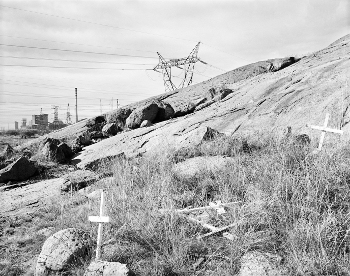'Structures of Dominion and Democracy' by David Goldblatt at the Johannes Stegmann Art Gallery

Photograph by David Goldblatt, On August 16 2012 South African Police shot striking mineworkers of the Lonmin platinum mines, killing 34 and wounding 78 within a radius of 350 metres of this koppie, where the men used to meet. Seventeen of the men, seeking shelter among boulders from police fire, were shot with seemingly lethal intent, some with their hands up in surrender, none were given medical assistance for their wounds. Beyond is the Lonmin smelter, which stood idle during the strike. Marikana, North-West Province, 11 May 2014. |
The University of the Free State, in partnership with the Goodman Gallery, presents the exhibition, 'Structures of Dominion and Democracy', by renowned South African photographer David Goldblatt.
This exhibition, which runs from 13 July to 7 August 2015 on the Bloemfontein Campus, is dedicated to the series, “Structures”, one of the major bodies of works by Goldblatt. For over three decades, Goldblatt has travelled South Africa, photographing sites and structures weighted with historical narrative: monuments, private, religious and secular, which reveal something about the people who built them. These sites allow us a glimpse into the everyday. Each place is a repository, a landscape containing an epic story that has involved whole communities: the experience sometimes told through the memorialising of remarkable individuals.
The exhibition, Structures of Dominion and Democracy, traverses two distinct eras in South Africa history. As Goldblatt explains: "Over the years, I have photographed South African structures, which I found eloquent, of the dominion which Whites gradually came to exert over all of South Africa and its peoples. That time of domination began in 1660 when Jan van Riebeeck ordered a cordon to be erected of blockhouses and barriers that would exclude the indigenous population from access to the first European settlement in South Africa and its herds, lands, water, and grazing. The time of domination ended on the 2nd of February 1990, when, on behalf of the government and the Whites of South Africa, President FW de Klerk effectively abdicated from power. Beginning in 1999 and continuing to the present, I have photographed some structures that are eloquent of our still nascent democracy. In the belief that, in what we build we express much about what we value, I have looked at South African structures as declarations of our value systems, our ethos.”
Johannes Stegmann Art Gallery, UFS Sasol Library
University of the Free State
206 Nelson Mandela Ave
Bloemfontein
Gallery hours:
Monday to Friday 08:30 – 16:30
Entrance: Free
Enquiries: 051 401 2706, dejesusav@ufs.ac.za